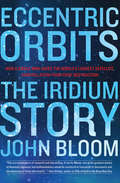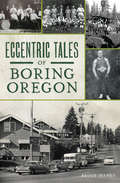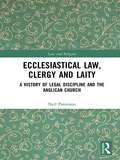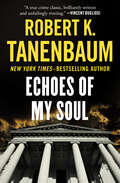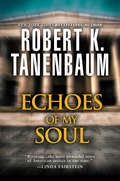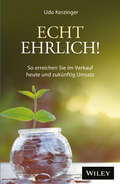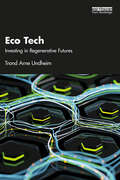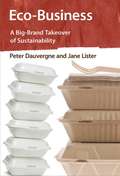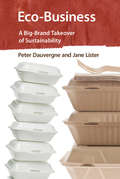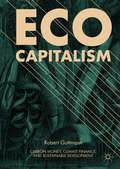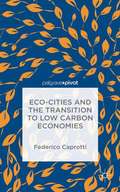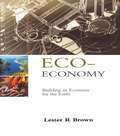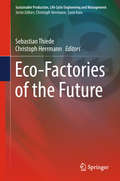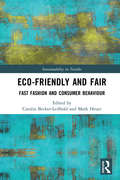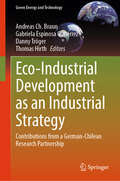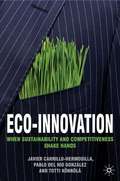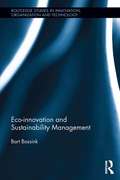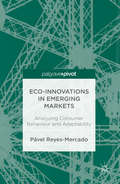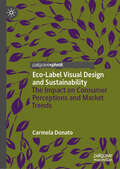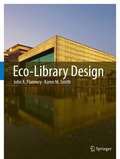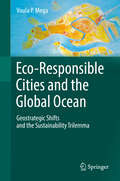- Table View
- List View
Ebro Puleva
by David E. Bell Mary Shelman Rocio Reina Paniagua Antonio Garcia de CastroOnce Spain's largest sugar company, Ebro Puleva has been transformed through a series of international acquisitions into the world's largest package rice company and second largest pasta company. In 2009, Chairman Antonio Hernandez Callejas must decide how to proceed now that the firm's sugar business has been sold. A specific question is whether the firm should sell its dairy business, which is limited to Spain. The case discusses the firm's branding strategy, approach to integration, and organizational structure used to manage a global business. The case also describes several changes in consumer behavior and the retail food market brought on by the global financial crisis.
Ebu$iness: 7 Steps To Get Your Small Business Online... And Making Money Now!
by Paul WallbankIs your business website a money pit? A source of frustration? A time-waster? Does your business even have an online presence? It's time to get your website working for you and making money. The web and social media have become the new shopfronts where customers, staff and suppliers look to find people to do business with. eBu$iness will help anyone who wants to set up and maintain a professional web presence by showing you how to: register an effective domain name set up your own free or cheap website use social media to your advantage optimise your website so that search engines and customers can find you take advantage of free local listing services and much more. Whether you already have a website or you're just starting out, eBu$iness gives you the tools and know-how to save time and money, and will help you to grow your business and make a profit.
Eccentric Orbits: The Iridium Story
by John Bloom“In the early 1990s, Motorola, the legendary American technology company developed a revolutionary satellite system called Iridium that promised to be its crowning achievement. Light years ahead of anything previously put into space, and built on technology developed for Ronald Reagan’s “Star Wars,” Iridium’s constellation of 66 satellites in polar orbit meant that no matter where you were on Earth, at least one satellite was always overhead, and you could call Tibet from Fiji without a delay and without your call ever touching a wire. ridium the satellite system was a mind-boggling technical accomplishment, surely the future of communication. The only problem was that Iridium the company was a commercial disaster. Only months after launching service, it was $11 billion in debt, burning through $100 million a month and crippled by baroque rate plans and agreements that forced calls through Moscow, Beijing, Fucino, Italy, and elsewhere. Bankruptcy was inevitable—the largest to that point in American history. And when no real buyers seemed to materialize, it looked like Iridium would go down as just a “science experiment.” That is, until Dan Colussy got a wild idea. Colussy, a former head of Pan-Am now retired and working on his golf game in Palm Beach, heard about Motorola’s plans to “de-orbit” the system and decided he would buy Iridium and somehow turn around one of the biggest blunders in the history of business. In “Eccentric Orbits”, John Bloom masterfully traces the conception, development, and launching of Iridium and Colussy’s tireless efforts to stop it from being destroyed, from meetings with his motley investor group, to the Clinton White House, to the Pentagon, to the hunt for customers in special ops, shipping, aviation, mining, search and rescue—anyone who would need a durable phone at the end of the Earth. Impeccably researched and wonderfully told, “Eccentric Orbits” is a rollicking, unforgettable tale of technological achievement, business failure, the military-industrial complex, and one of the greatest deals of all time.
Eccentric Tales of Boring, Oregon
by Bruce HaneyThe town of Boring has seen more than its fair share of interesting events since its founding in 1903. From secretly hiring an up-and-coming boxer to fight the town bully to the time firecrackers were blamed for burning down half the town, memorable moments abound. Discover the story of the wild man who lived in the woods and the attempts of Prohibition-era moonshiners to evade the law. Uncover the true identity of the Wild West Gang and the real story of a runaway train loaded with potatoes. Join author Bruce Haney as he explores the peculiar tales of an exciting town.
Ecclesiastical Law, Clergy and Laity: A History of Legal Discipline and the Anglican Church (Law and Religion)
by Neil PattersonDiscipline in an ecclesiastical context can be defined as the power of a church to maintain order among its members on issues of morals or doctrine. This book presents a scholarly engagement with the way in which legal discipline has evolved within the Church of England since 1688. It explores how the Church of England, unusually among Christian churches, has come to be without means of effective legal discipline in matters of controversy, whether liturgical, doctrinal, or moral. The author excludes matters of blatant scandal to focus on issues where discipline has been attempted in controversial matters, focussing on particular cases. The book makes connections between law, the state of the Church, and the underlying theology of justice and freedom. At a time when doctrinal controversy is widespread across all Christian traditions, it is argued that the Church of England has an inheritance here in need of cherishing and sharing with the universal Church. The book will be a valuable resource for academics and researchers in the areas of law and religion, and ecclesiastical history. .
Echoes of My Soul
by Robert K. TanenbaumFrom the New York Times–bestselling author, a thrilling true crime story of grisly murder, police corruption, and an attorney&’s work to save an innocent man. In 1963, Emily Hoffert and Janice Wylie were just two young women living on Manhattan&’s Upper East Side. Then one muggy day in August, an intruder made his way into their apartment where he raped and murdered them. Months passed before the police had a suspect in custody. His name was George Whitmore Jr., a nineteen-year-old Black man with an IQ of less than 70. After giving a confession, Whitmore was convicted and incarcerated, but Asst. DA Mel Glass was not so certain of the young man&’s guilt . . . In Echoes of My Soul, bestselling author and renowned prosecutor Robert K. Tanenbaum delves into the historic case of the &“Career Girls Murders.&” He examines the brutal crime and the troubling investigation, full of law enforcement missteps and cover-ups. The author also details the story of an ADA who placed his career on the line to free an innocent man whose story would ultimately go on to influence the American justice system. &“A strong candidate to become a true crime classic. . . . Brilliantly written and unfailingly riveting.&” —Vincent Bugliosi, author and prosecutor of the Manson Family Tate–LaBianca murders &“Echoes of My Soul has the excitement of a great work of fiction and it is not &‘based&’ upon a real case. It is a real case and it is about a real hero.&” —Mark Lane, attorney and civil rights activist &“A compelling, page turning, disturbing true story.&” —Jesse Choper, Earl Warren Professor of Public Law, Emeritus, University of California, Berkeley
Echoes of my Soul
by Robert K. Tanenbaum"Stunning, riveting." --Linda Fairstein"Tanenbaum knows this territory better than anyone." -Linda FairsteinIt was a muggy summer day when Janice Wylie and Emily Hoffert were murdered in their apartment on Manhattan's Upper East Side. Months passed before police arrested George Whitmore, Jr., and he confessed to the crime. But his incarceration would entail a host of shocking law enforcement missteps and cover-ups. In this first insider's account, New York Times bestselling author Robert K. Tanenbaum delivers a page-turning real-life thriller about this historic case--from the brutal crime to the wrenching conviction, which forever reformed the American justice system. "A true crime classic, brilliantly written and unfailingly riveting." --Vincent Bugliosi"Thrilling and insightful." -Publishers Weekly"A nonfiction murder mystery, an intriguing saga." --Kirkus ReviewsWith 16 Pages Of Dramatic Photos
Echoing Green
by James Weber Thomas J. Delong Julie BattilanaThis case presents the leadership challenges that Cheryl Dorsey, the president of Echoing Green, faces in early 2009. Echoing Green is a fellowship program that seeks to improve society by identifying and supporting social entrepreneurs who launch organizations to attack some of the world's most difficult problems. After turning Echoing Green around and re-building an organization almost from scratch over the last 7 years, Dorsey feels that Echoing Green is at a crossroads as it is facing much more competition. Adding to Dorsey's challenges, in late 2008 the economy is in crisis and many Echoing Green supporters are reducing or delaying their donations. In this situation, Dorsey has to decide whether, and if so, how to change Echoing Green's strategy as well as whether she is the right person to continue to lead the organization.
Echt ehrlich!: So erreichen Sie im Verkauf heute und zukünftig Umsatz
by Udo KerzingerUdo Kerzinger hat erkannt, dass der Mensch im Verkauf in den Mittelpunkt gestellt werden muss, um wirklich erfolgreich zu sein. Seine Erfahrungen und sein Wissen möchte er im vorliegenden Buch teilen. Er befasst sich darin zuerst einmal mit der Situation als Verkäufer aber auch als Kunde in unserer Gesellschaft. Das Bild und das Image, was ein Verkäufer hat, werden beschrieben. Die meisten Verkäufer und Verkaufsbücher arbeiten daran, mit welchen Techniken sie den Kunden "rumkriegen". Die wenigsten arbeiten an sich. Deshalb beginnt Kerzinger bei seinem Ansatz der radikalen Ehrlichkeit erst einmal beim Verkäufer selbst. Der erste Teil des Buches widmet sich damit, sich als Verkäufer selbst zu reflektieren, wie ehrlich er mit sich umgeht, woran es liegen könnte, dass er nicht erfolgreich ist und was er genau tun muss, um authentisch und anziehend zu sein. Der zweite Teil des Buches widmet sich dem Thema, wie ein Verkäufer anderen Menschen begegnen muss, um langfristige erfolgreiche Beziehungen aufzubauen. Wie muss er sein und was muss er tun - nämlich authentisch und wahrhaftig. Alles andere geht dann fast wie von allein.
Eclipse of the Public Corporation
by Michael C. JensenThe publicly held corporation has outlived its usefulness in many sectors of the economy. New organizations are emerging. Takeovers, leveraged buyouts, and other going-private transactions are manifestations of the change. A central source of waste in the public corporation is the conflict between owners and managers over free cash flow. This conflict helps explain the prominent role of debt in the new organizations. The new organizations' resolution of the conflict explains how they can motivate people and manage resources more effectively than public corporations. McKinsey Award Winner.
Eco Tech: Investing in Regenerative Futures
by Trond UndheimThe book is a seminal contribution from a leading futurist who, over the past three decades, has explored each of the most disruptive forces shaping our world today, including emerging technologies, entrepreneurship, venture investments, and industrial manufacturing. Eco Tech brings all this thinking together, fusing insight from thought leaders with the author’s own considerable experience, to explore scenarios for 2050 and discuss eco-effectiveness as an established practice for governments, corporations, startups, and individuals. Trond Arne Undheim begins by providing a brief history of sustainability and provides simple definitions for key terms including eco-efficiency, life cycle analysis, industrial ecology, cleantech, net zero, climate change, biodiversity, and carbon capture, which will enable the reader to engage confidently in eco-discussions. Undheim also explores the ambitions of regeneration and offers a new conceptual framework to facilitate future discussion around sustainable innovation. He applies this framework to green, ambitious start-ups and examines the way these ventures will lead the way towards an eco-effective society, drawing on stories from exciting founders who are already changing the world. Finally, the book takes a deep dive into emerging eco-innovations, including batteries, bioplastics, distributed energy, space tech, and futuristic megaprojects. The book contains clear directions on how to progress through adversity and avoid returning to the status quo. The book will be an essential guide for executives, sustainability professionals, and energy tech investors who are deeply concerned with the future and are prepared to both significantly invest in it and make behavioral changes to foster regenerative development. It will also be a great resource for students and scholars of sustainable investing and innovation.
Eco-Business
by Peter Dauvergne Jane ListerMcDonald's promises to use only beef, coffee, fish, chicken, and cooking oil obtained from sustainable sources. Coca-Cola promises to achieve water neutrality. Unilever has set a deadline of 2020 to reach 100 percent sustainable agricultural sourcing. Walmart has pledged to become carbon neutral. Today, big-brand companies seem to be making commitments that go beyond the usual "greenwashing" efforts undertaken largely for public relations purposes. In Eco-Business, Peter Dauvergne and Jane Lister examine this new corporate embrace of sustainability, its actual accomplishments, and the consequences for the environment. For many leading-brand companies, these corporate sustainability efforts go deep, reorienting central operations and extending through global supply chains. Yet, as Dauvergne and Lister point out, these companies are doing this not for the good of the planet but for their own profits and market share in a volatile, globalized economy. They are using sustainability as a business tool. Advocacy groups and governments are partnering with these companies, eager to reap the governance potential of eco-business efforts. But Dauvergne and Lister show that the acclaimed eco-efficiencies achieved by big-brand companies limit the potential for finding deeper solutions to pressing environmental problems and reinforce runaway consumption. Eco-business promotes the sustainability of big business, not the sustainability of life on Earth.
Eco-Business: A Big-Brand Takeover of Sustainability (The\mit Press Ser.)
by Peter Dauvergne Jane ListerTwo experts explain the consequences for the planet when corporations use sustainability as a business tool.McDonald's promises to use only beef, coffee, fish, chicken, and cooking oil obtained from sustainable sources. Coca-Cola promises to achieve water neutrality. Unilever seeks to achieve 100 percent sustainable agricultural sourcing by 2020. Walmart has pledged to become carbon neutral. Big-brand companies seem to be making commitments that go beyond the usual “greenwashing” efforts undertaken largely for public-relations purposes. In Eco-Business, Peter Dauvergne and Jane Lister examine this new corporate embrace of sustainability, its actual accomplishments, and the consequences for the environment. For many leading-brand companies, these corporate sustainability efforts go deep, reorienting central operations and extending through global supply chains. Yet, as Dauvergne and Lister point out, these companies are doing this not for the good of the planet but for their own profits and market share in a volatile, globalized economy. They are using sustainability as a business tool. Dauvergne and Lister show that the eco-efficiencies achieved by big-brand companies limit the potential for finding deeper solutions to pressing environmental problems and reinforce runaway consumption. Eco-business promotes the sustainability of big business, not the sustainability of life on Earth.
Eco-Capitalism: Carbon Money, Climate Finance, and Sustainable Development
by Robert GuttmannOur planet faces a systemic threat from climate change, which the world community of nations is ill-prepared to address, and this book argues that a new form of ecologically conscious capitalism is needed in order to tackle this serious and rising threat. While the Paris Climate Agreement of 2015 has finally implemented a global climate policy regime, its modest means belie its ambitious goals. Our institutional financial organizations are not equipped to deal with the problems that any credible commitment to a low-carbon economy will have to confront. We will have to go beyond cap-and-trade schemes and limited carbon taxes to cut greenhouse gas emissions substantially in due time. This book offers a way forward toward that goal, with a conceptual framework that brings environmental preservation back into our macro-economic growth and forecasting models. This framework obliges firms to consider other goals beyond shareholder value maximization, outlining the principal tenets of a climate-friendly finance and introducing a new type of money linked to climate mitigation and adaptation efforts.
Eco-Cities and the Transition to Low Carbon Economies
by Federico CaprottiEco-cities are increasingly being marketed as solutions to a range of pressing global concerns, such as environmental and climate change, hyper-urbanization, demographic shifts, energy security, and the Peak Oil scenario. In response to these issues, eco-cities are being conceptualized as 'experimental cities', new urban areas in which new technologies and ways of organizing urban and economic life can be trialled, and where transition pathways towards low-carbon economies can be tested. The author examines the two most advanced eco-city projects under construction at the time of writing - the Sino-Singapore Tianjin Eco-City in China, and Masdar City in Abu Dhabi, United Arab Emirates. These are the largest and most notable attempts at building new eco-cities to both face up to the 'crises' of the modern world and to use the city as an engine for transition to a low-carbon economy.
Eco-Economy: Building an Economy for the Earth
by Lester R. BrownIn 1543, Polish astronomer Nicolaus Copernicus challenged the view that the sun revolved around the earth, arguing instead that the earth revolved around the sun. His paper led to a revolution in thinking. In Lester Brown's brilliant and invigorating account of the industrial economy, he shows how a rethink of its fossil fuel-based, throwaway ethos is necessary to ensure that it works with, not against, the natural environment. The issue now is whether the environment is part of the economy or the economy is part of the environment. Brown argues the latter, pointing out that treating the environment as part of the economy has produced an economy that is destroying its natural support systems. One of the foremost experts on the new economic opportunities, Brown shows the vast economic potential and environmental gains that exist from eliminating the waste and destruction of current consumption. He describes how the global economy can be restructured to make it compatible with the earth's ecosystem so that economic progress can continue, with high standards of living and secure employment for all, while conserving resources and restoring the environment. In the new economy, wind farms replace coal mines, hydrogen-powered fuel cells replace internal combustion engines, and cities are designed for people, not cars. Eco-Economy is a map of how to get from here to there. It is an essential guide to the economy of the 21st century and will be compelling reading for business readers and environmentalists alike looking for ways to build a better future.
Eco-Factories of the Future (Sustainable Production, Life Cycle Engineering and Management)
by Christoph Herrmann Sebastian ThiedeThis edited monograph presents a selection of research contributions on eco-factories of the future. The topical focus lies on cutting-edge solutions from academia and industry that enable and support companies in their efforts towards sustainable manufacturing. The authors provide an overview over recent developments, aiming at a comprehensive understanding of eco- and cost-efficient manufacturing from machine to factory level. The solutions contributed by leading research institutions and companies have been mostly implemented and evaluated in industrial pilot projects across Europe. The methodological approaches cover topics such as factory planning, manufacturing simulation, energy management as well as life cycle evaluation. The target audience comprises industry experts and decision makers as well as researchers in the field of sustainable manufacturing.
Eco-Friendly and Fair: Fast Fashion and Consumer Behaviour (Textile Institute Series: Responsibility and Sustainability)
by Mark Heuer Carolin Becker-LeifholdThe make-take-waste paradigm of fast fashion explains much of the producer and consumer behavior patterns towards fast fashion. The evolution from a two-season fashion calendar to fast fashion, characterized by rapid product cycles from retailers and impulse buying by consumers, presents new challenges to the environment, workplace and labour practices. This book provides a comprehensive overview of new insights into consumer behaviour mechanisms in order to shift practices toward sustainable fashion and to minimize the negative impacts of fast fashion on the environment and society. Concepts and techniques are presented that could overcome the formidable economic drivers of fast fashion and lead toward a future of sustainable fashion. While the need for change in the fashion industry post-Rana Plaza could not be more obvious, alternative and more sustainable consumption models have been under-investigated. The paucity of such research extends to highly consumptive consumer behaviours regarding fast fashion (i.e. impulse buying and throwaways) and the related impediments these behaviours pose for sustainable fashion. Written by leading researchers in the field of sustainable fashion and supported by the Textile Institute, this book evaluates fashion trends, what factors have led to new trends and how the factors supporting fast fashion differ from those of the past. It explores the economic drivers of fast fashion and what social, environmental and political factors should be maintained, and business approaches adopted, in order for fast fashion to be a sustainable model. In particular, it provides consumer behaviour concepts that can be utilized at the retail level to support sustainable fashion.
Eco-Industrial Development as an Industrial Strategy: Contributions from a German-Chilean Research Partnership (Green Energy and Technology)
by Thomas Hirth Andreas Ch. Braun Gabriela Espinosa Gutiérrez Danny TrögerThis book reports on the results of a 6-year international collaboration between four universities such as the Karlsruhe Institute of Technology (Germany), the Universidad de Chile, the Universidad Austral de Chile and the Universidad de Concepcion (Chile) on the topic of Eco-Industrial Development, i.e. on how industry can learn from ecosystems in order to increase its sustainability. On the one hand, this book presents the findings of the projects run by the network of researchers from Chile and Germany, including chapters on renewable energy production, circular economy, sustainable agriculture, and social and environmental impact assessment, among others. On the other hand, it highlights the importance of international academic collaboration in order to achieve sustainable transformations in industry, while also providing insights into the particular challenges and opportunities of eco-industrial development in Chile. All in all, this book provides both academics and professionals with a timely snapshot on principles and best practices for industrial sustainability and sustainable development.
Eco-Innovation
by Javier Carrillo-HermosillaThis book considers the impact industry has on our environmental surroundings while exploring the need for more sustainable development. The concept of sustainable development and the general understanding of the interdependence of the environment and the economy are both examined in this thought-provoking new book.
Eco-Innovation and Sustainability Management (Routledge Studies in Innovation, Organizations and Technology)
by Bart BossinkSustainability is a phenomenon that must be pursued in a complex system of interrelated elements of business, society, and ecology. It is important to gain an understanding of these elements, the interplay between them, and the behavior of the system. This book explores the business-societal-and-ecological system in which sustainable innovation has to be envisioned, conceptualized, realized, and improved. Author Bart Bossink offers insight into the systematic coherence of drivers of eco-innovation and sustainability utilizing a three-part approach: (1) eco- and sustainable innovation in business is based on ideas and people who cooperatively develop these ideas; (2) groups of people, organized in commercial firms, must realize these ideas cooperatively and create the innovations that can conquer the market; and (3) that people from governmental, non-governmental, not-for-profit, research, and commercial organizations can build institutional arrangements that stimulate these sustainable innovations, changing both industry and society. Adopting a managerial perspective and discussing concepts and methods to manage eco-innovation in business, this book highlights the interrelated roles of the individual, the firm, partnerships, and business environments. Researchers and practitioners who want to combine a commercial and economical approach with an ethical and social ambition to create an ecologically sustainable firm stand to learn much from these pages.
Eco-Innovations in Emerging Markets
by Pável Reyes-MercadoThrougha comprehensive analysis of cognitive factors and eco-innovation attributes,this book provides an understanding into why and how renewable energytechnologies are adopted in an emerging market. Drawing on theories such astheory of reasoned action and theory of planned behaviour, Eco-Innovations in Emerging Markets proposes an extended cognitivemodel to analyse consumer behaviour in this area. Through the use of advancedstatistical techniques such as Partial Least Squares, the book presents empiricaldata and discusses the implications they pose for policy makers and corporatemanagers.
Eco-Label Visual Design and Sustainability: The Impact on Consumer Perceptions and Market Trends
by Carmela DonatoThis book delves into the critical role of eco-labels as signals in a marketplace increasingly driven by consumer demand for sustainable products. It begins with an exploration of how eco-labels function within a tripartite system involving consumers, producers, and third-party certifiers, highlighting the challenges and opportunities in their creation, promotion, and validation. Building on this foundation, the book examines the influence of visual aesthetics on consumer perceptions, drawing from aesthetic psychology and marketing literature to explore how design elements—such as visual and conceptual complexity, color, and text—affect consumer attitudes and trust. The empirical core of the book evaluates real-world eco-labels, analyzing how their visual design impacts sustainability perceptions and label adoption. By synthesizing theoretical insights and empirical findings, the book offers practical recommendations for marketers, designers, and policymakers, aiming to improve eco-label effectiveness in fostering sustainable consumer behavior.
Eco-Library Design
by John A. Flannery Karen M. SmithThe ancient pairing of architecture and books has always been an interesting topic for debate, and the increasing popularity of electronic books has recently added fuel to the fire. However, the bonfires built for the printed version remain unlit. Research undertaken for this publication suggests that the traditional reading room is currently enjoying a renaissance in many different guises, with print and digital media enjoying a symbiotic relationship. The digital revolution is just one of the many challenges faced by the library architect. To satisfy the varied requirements of library users, flexible, future proof, indoor and outdoor spaces must now support both passive and active pursuits. These often contrasting demands can vary dramatically from quiet, contemplative reading to audible public performance. This publication explores in detail the evolution of the eco-library, focusing on how design teams cope with diminishing resources in diverse geographic and climatic conditions. The featured projects demonstrate measurable reductions in both construction and operating costs through innovative designs that utilise the ecology of a selected site in a positive way. A library development will now inevitably seek to lead by example, visibly demonstrating sound environmental practice, and providing an enhanced user experience for increasingly more discerning patrons. Eco-Library Design provides a worldwide perspective on 21st century trends in library architecture.
Eco-Responsible Cities and the Global Ocean: Geostrategic Shifts And The Sustainability Trilema
by Voula P. MegaThis book examines the nexus of cities and oceans and the interrelations between the Sustainable Development Goals (SDGs) 11 and 14, just after the first two critical years following the milestone year of hope in 2015. It advocates for actions both for sustainable cities, the largest interconnected and only human ecosystem, and for the global ocean that is the largest physical ecosystem. Cutting-edge concepts and actions are presented by and for cities and oceans, following the global engagements during the years 2015-2017. In the era of global geopolitics, cities offer major democratic spaces between the micro-regulations of the local communities and the governance of the global commons. The role of education, trust, and citizen empowerment cannot be stressed enough. This book offers an evidence-based, holistic and integrated view of key urban and ocean sustainability issues at the horizon of 2030 and of 2050. The chapters cover the most prominent issues at the heart of the matter, and highlight systemic multi-stakeholder eco-responses towards sustainability with economic, social, environmental dimensions, including political and cultural aspects. This book offers a full exploration of cities and seas with an emphasis on vigorous paradigm shifts, redesigning human systems, and reconciling them with nature. Building on robust evidence, and transformational cases, it provides structured advice for world leaders, stakeholders and scholars.


